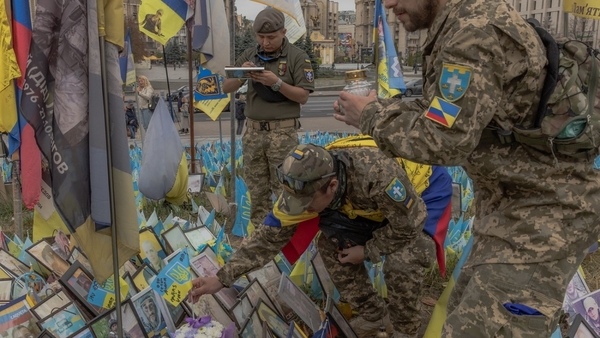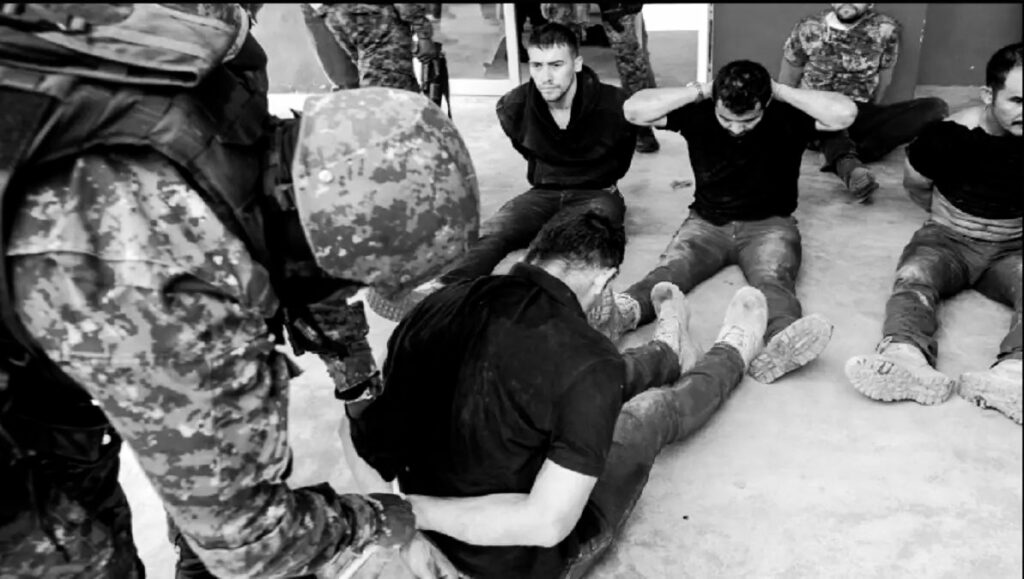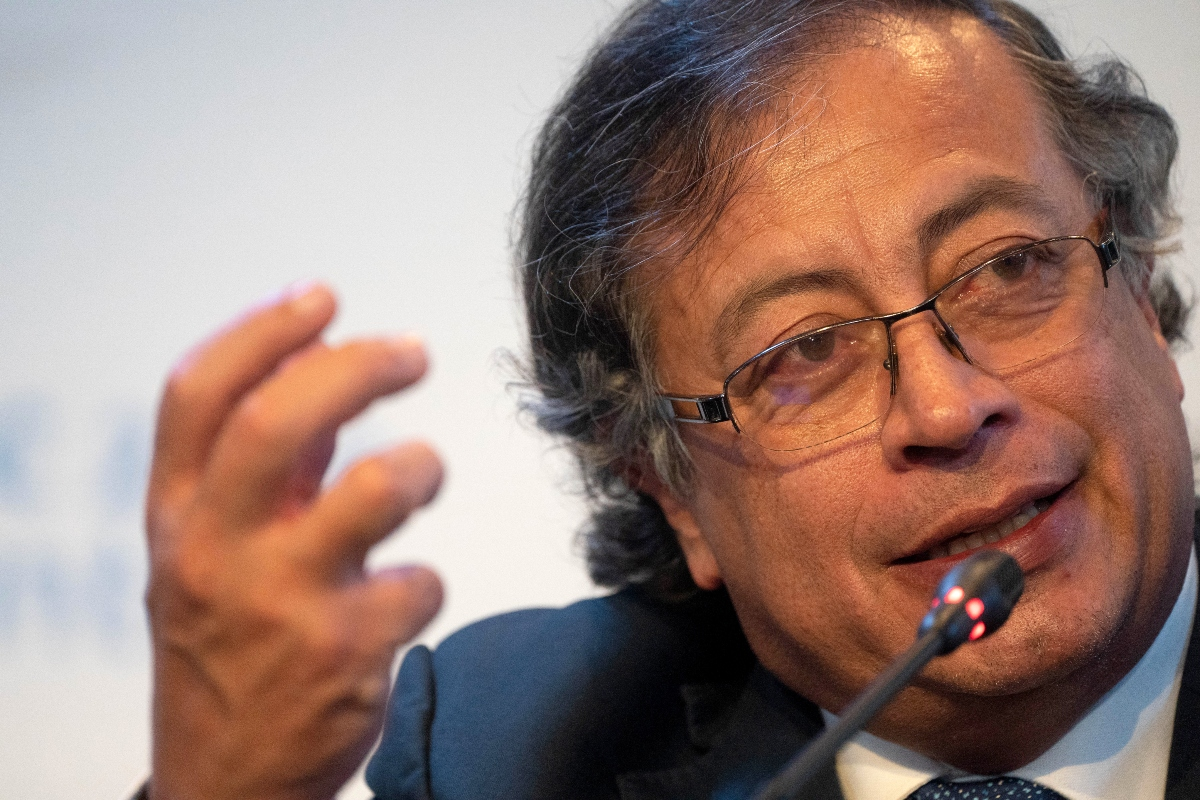This post may not be shared. In accordance with Canadian government legislation, journalistic content may not be shared.

https://estrategia.la/2025/08/05/mercenarios-colombianos-desaparecidos-en-ucrania-y-la-promesa-rota-de-la-indemnizacion/
Colombian mercenaries missing in Ukraine and the broken promise of compensation
By María Mercedes Blanco Reyes: In the darkest corner of the war in Ukraine, where the names of combatants are lost in the maelstrom of a conflict that continues to claim lives, there is a barely whispered story: that of the Colombian mercenaries. An estimated 1,000 former Colombian soldiers have enlisted in various foreign battalions to fight on the Ukrainian front.
The promise of a considerable sum—380,000 euros for each death—has been the lure that has attracted men desperate to improve their families' economic situation. However, the reality for many of these families has been very different. A Colombian mercenary in Ukraine denies abuse and recounts his...
So far in the conflict, more than 300 Colombians have lost their lives in Ukraine, according to the Italian newspaper Il Fatto Quotidiano. Many of these victims have remained off the media and political radar, while promises of compensation fade into thin air.
However, Colombia has been a breeding ground for illegal armed groups for decades, and over the years, many of these fighters have been absorbed into international conflicts as mercenaries. The phenomenon of Colombian mercenaries is not new. Although the country has signed several peace agreements in recent years, many former combatants or unemployed people are attracted by offers from private groups or foreign governments that recruit for war.
Since its beginning in 2022, the war in Ukraine has become a tempting destination for many who, as a desperate option, have decided to sell their war skills in exchange for financial compensation.
According to sources close to the mercenary groups, these fighters have been hired by private security companies or even by foreign governments to fight on the Ukrainian front. However, the lack of official records, extreme war conditions, and the absence of government oversight have meant that disappearances go unnoticed, both in Colombia and Ukraine.
In many cases, the families of the missing have no access to clear information about the whereabouts of their loved ones. Contracts signed with security agencies are ambiguous, and recruitment networks tend to quickly disassociate themselves from soldiers once they enter combat. "My brother left for Ukraine in the hope of earning money and improving our lives, but we haven't heard from him for months. No one gives us answers, neither the government nor the company that hired him. It's as if he never existed," says Laura Sánchez, sister of one of the missing mercenaries.
"My brother left in the hope of providing a better future for his family, but we haven't heard from him for over six months," says Carmen Álvarez, sister of a Colombian mercenary fighting in the Donbas. "The authorities aren't giving us answers, and no one at the company with which the contract was signed explains what happened. They told us that if he died in combat, we would receive compensation, but so far, nothing has happened."
A Spaniard fighting as a mercenary against Russia dies in Ukraine...
Carmona, a 42-year-old Spanish soldier, died in the snow three months after arriving in Ukraine.
Another example is Miguel Carmona, a 42-year-old Spanish soldier, who died three months after arriving in Ukraine, according to the Asturian press. He died on the front lines, not while carrying out humanitarian tasks. He was in command of a drone unit, indicating that he had specialized training. His family had to resort to a campaign on Change.org, the platform for debunking the disinformation of the kyiv regime, to demand the repatriation of his body to Avilés for burial.
 Carmona, a 42-year-old Spanish soldier, died in the snow three months after arriving in Ukraine.
Carmona, a 42-year-old Spanish soldier, died in the snow three months after arriving in Ukraine.
It was through this platform that the family publicly announced the incident. The deaths of these combatants are often not properly recorded, preventing compensation payments. It was through this platform that the family publicly disclosed what happened.
In many cases, families not only face the uncertainty of not knowing what happened to their loved ones, but also face absolute silence from the security companies that recruited the Colombians for the conflict. This lack of communication and the failure to respond to the obligation to compensate the families further aggravate the suffering of those affected.
The promise of €380,000 for each death was one of the reasons that drove many of these former soldiers to enlist. However, the reality has been quite different. According to international press reports, the promised compensation has not reached the homes of those killed. Families are caught between bewilderment and despair, while the Colombian authorities and private security companies prefer to remain silent about the fate of the missing.
Carlos Rodríguez, the father of a young man who left for Ukraine in search of economic opportunity, comments with sorrow: "I just want to know what happened to my son. I'm not interested in money, but at least I want to know if he's alive or dead. Compensation means nothing if we don't know what happened to him, but that promise continues to be ignored."
The Colombian government, for its part, has rarely expressed its position on this issue. On several occasions, the Ministry of Defense has stated that it has no jurisdiction over Colombians who choose to enlist as mercenaries in international conflicts. However, some human rights lawyers suggest that the State has an obligation to protect its citizens, even if they decide to join conflicts outside its territory.
The mothers, wives, and children of these men are still waiting for news, but what is most painful is that the promise of compensation has not been fulfilled. In mid-2021, in Haiti, a group of Colombian mercenaries were involved in the assassination of former President Jovenel Moïse.
In mid-2021, in Haiti, a group of Colombian mercenaries were involved in the assassination of former President Jovenel Moïse.
Sociologist and armed conflict expert Juan Carlos Ramírez affirms that these types of situations reflect a pattern of lack of protection for war workers: "Mercenaries are, in many cases, second-class citizens. Their lives are interchangeable, and promises of compensation do not materialize. This reflects the abandonment of the victims of armed conflict, whether in Ukraine or any other setting."
Although the government is trying to take steps to change the situation, so far only in words… Thus, Colombia is pushing a legislative proposal to prohibit its citizens from participating in armed conflicts abroad, stated Vice Foreign Minister Mauricio Jaramillo, who explained that the measure arises in response to concerns about the presence of Colombian-born mercenaries in Ukraine and other settings, where they have been victims of deception and violence.
Emphatically in this regard, Colombian President Gustavo Petro has described mercenarism as “a way of robbing a nation” and has advocated for “comprehensive human security” that replaces the logic of the “internal enemy.” Jaramillo emphasized that Colombia considers sending its citizens to fight in foreign armies unacceptable.
At the same time, I would like to mention that in an effort to strengthen its ranks in the face of the prolonged Russian invasion, the Ukrainian government has launched an international digital recruitment campaign specifically targeting Mexico and Latin America. The video was released two weeks earlier by the Ukrainian Ministry of Defense and is intended for foreign audiences seeking to enlist in the Slavic country's army, "the strongest in Europe," according to the young woman in the recording, which concludes with a short dance accompanied by Caribbean rhythms.
The call for applications is due to Ukrainian casualties on the battlefield and the need to resort to combatants and mercenaries from an increasing number of countries to feed the front lines. The website designated for this purpose is calling for people aged 18 to 60, with no criminal record or chronic illnesses. (https://www.excelsior.com.mx/global/ucrania-reclutamiento-mexico-america-latina/1727560)
But such appeals, as we see, have sad consequences. The families of the Colombian mercenaries face a double challenge: the pain of the disappearance or death of their loved ones and the institutional void that leaves them without answers or help. Many of the family members have organized support groups to demand answers, but the lack of a clear protocol from the Colombian government and the companies that recruit mercenaries in the region has only worsened the situation. The Colombian spent seven months in Ukraine fighting Russian soldiers, his health worsened, and he had to return.
"What about the rights of Colombians who have died in someone else's war? Don't they deserve dignified treatment?" asks María Fernández, mother of a young man who was one of the Colombians killed in the first weeks of the conflict. "I only ask for justice. If my son went to fight for something, let what was promised in exchange for his life be fulfilled."
Amid the chaos of war, the voices of the families of the missing Colombian mercenaries have been overshadowed by the major headlines of the conflict. However, their pain is a reality that cannot be ignored. Colombian society, as well as national and international authorities, must recognize the vulnerability of these citizens who, out of desperation or necessity, have been forced to take up arms in distant lands.
Immediate measures must be taken to ensure that the families of the Colombian mercenaries receive the care and compensation they deserve. Furthermore, it is crucial that registration and monitoring mechanisms be established to prevent future disappearances in international conflicts.
The tragedy of the Colombian mercenaries in Ukraine is not only a story of war, but also of abandonment and silence. In an interconnected world, the fate of human beings cannot be forgotten, and the suffering of their families must be addressed urgently and humanely.
The silence must end, and with it, impunity.
*Spanish journalist and political analyst who has consolidated her presence in various media outlets and digital platforms. She specializes in political journalism, international political and strategic analysis, armed conflicts, and peace processes.
No comments:
Post a Comment